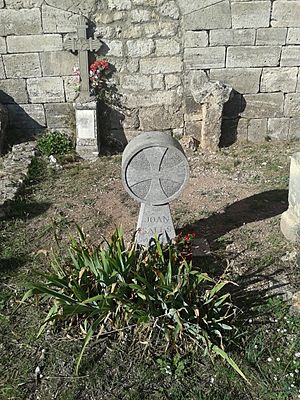Joan Sales i Vallès facts for kids
Joan Sales i Vallès (born in 1912, died in 1983) was a Catalan writer, translator, and publisher. He worked hard to keep Catalan culture alive during the time of the Franco dictatorship in Spain. His most famous book is a novel called Uncertain Glory (in Catalan: Incerta Glòria).
Quick facts for kids
Joan Sales i Vallès
|
|
|---|---|
| Born | 19 November 1912 Barcelona
|
| Died | 12 November 1983 Barcelona
|
| Burial place | Siurana (Priorat) |
| Monuments | Mirador de Joan Sales (Barcelona) https://bcnsostenible.cat/web/punt/mirador-de-joan-sales |
| Occupation | Catalan writer, publisher and translator |
|
Notable work
|
Uncertain Glory, Winds of the Night |
Contents
Life Story of Joan Sales
Joan Sales was born in Barcelona on November 19, 1912. His father came from Vallclara and his mother from Terrassa.
Early Political Actions
From a young age, Joan Sales was interested in politics. He didn't agree with his family's traditional views. When he was just 15, he was put in prison for three months. This happened because he protested against the government of Miguel Primo de Rivera.
In 1928, he helped start a political group called the Partit Comunista Català. There, he met his future wife, Núria Folch i Pi. Later, this group joined another one called the Bloc Obrer i Camperol in 1931. However, Joan Sales soon left this new group. He felt it was too strict and moving away from its Catalan roots.
In 1932, Joan Sales finished his law degree. He also became one of the first people officially allowed to teach the Catalan language.
Experiences in the Spanish Civil War
When the Spanish Civil War began, Joan Sales joined the Catalan Military Academy. He became an officer and was sent to fight on the front lines. He served in different areas, including Madrid and the Aragon front.
In 1938, he was arrested and held for several weeks. This was because he didn't report two of his brothers who had gone missing after being called to serve in the army. Many men in his family were held, and sadly, three of his six brothers died from typhus in a camp. Joan Sales was found innocent and returned to the war. He was part of the last groups to fight against Franco's soldiers at the Balaguer bridge. He also helped protect people retreating from the war. In the final days of the war, he was promoted to a higher rank.
Life in Exile and Return
After the Spanish Republic lost the war to the fascists, Joan Sales was one of the last people to leave Spain. He went into France to live in exile. He spent nine years living outside Spain. He lived in France, the Dominican Republic, and Mexico. In Mexico, he worked as a typesetter, which means he helped prepare books for printing.
He returned to Catalonia in 1948. That's when he started writing his most important book, Uncertain Glory. He also worked hard to publish books in Catalan. This was difficult because the Franco government censored, or controlled, what could be published.
Joan Sales passed away in Barcelona in 1983. He was buried in Siurana, Priorat. His wife, Núria Folch, was buried next to him when she died in 2010. They had a daughter, Núria Sales i Folch, who became a historian.
Publisher and Translator
As a publisher, Joan Sales started a company called Club Editor. He played a very important role in keeping Catalan culture and literature alive during the Franco dictatorship.
He published many classic Catalan books. Some of the most famous include In Diamond Square by Mercè Rodoreda and The Doll's Room by Llorenç Villalonga. He also published poems by his good friend, Màrius Torres. They even published a book of letters they wrote to each other during the war and his time in exile.
Joan Sales also translated books into Catalan. He translated works by famous authors like Dostoevsky, Kazantzakis, and Mauriac. You can see the influence of Dostoevsky in his great novel, Uncertain Glory.
Joan Sales's Political Beliefs
Joan Sales was a strong Christian Democrat and a dedicated Catalan nationalist. After he returned from exile, he joined a political party called the Democratic Union of Catalonia.
He explained that he became a Catholic during the Civil War. He had seen so much suffering and death. He felt that his chosen party was the only one that hadn't been involved in violence.
He wrote his masterpiece, Uncertain Glory, to honor his friends who died in the war. He wanted to share what he had experienced. He aimed to tell the truth about the war, against what he saw as false stories from different sides.
Books by Joan Sales
Here are some of the books Joan Sales wrote or compiled:
- 1950 Rondalles escollides de Guimerà, Casaponce i Alcover (illustrated by Elvira Elias)
- 1951 Rondalles gironines i valencianes (illustrated by Elvira Elias)
- 1952 Rondalles d'ahir i avui (illustrated by Montserrat Casanova)
- 1952 Viatge d'un moribund
- 1953 Rondalles escollides de Ramon Llull, Mistral i Verdaguer (illustrated by d'Elvira Elias, with a preface by Carles Riba)
- 1956 Uncertain Glory (Incerta glòria) - A longer, uncensored version was released in 1971.
- 1972 En Tirant lo Blanc a Grècia, òpera bufa
- 1976 Cartes a Màrius Torres (Letters to Màrius Torres)
- 1983 Winds of the Night (El vent de nit)
- 1986 Cartes de la guerra (Letters from the War)
See also
 In Spanish: Joan Sales para niños
In Spanish: Joan Sales para niños
 | Madam C. J. Walker |
 | Janet Emerson Bashen |
 | Annie Turnbo Malone |
 | Maggie L. Walker |


